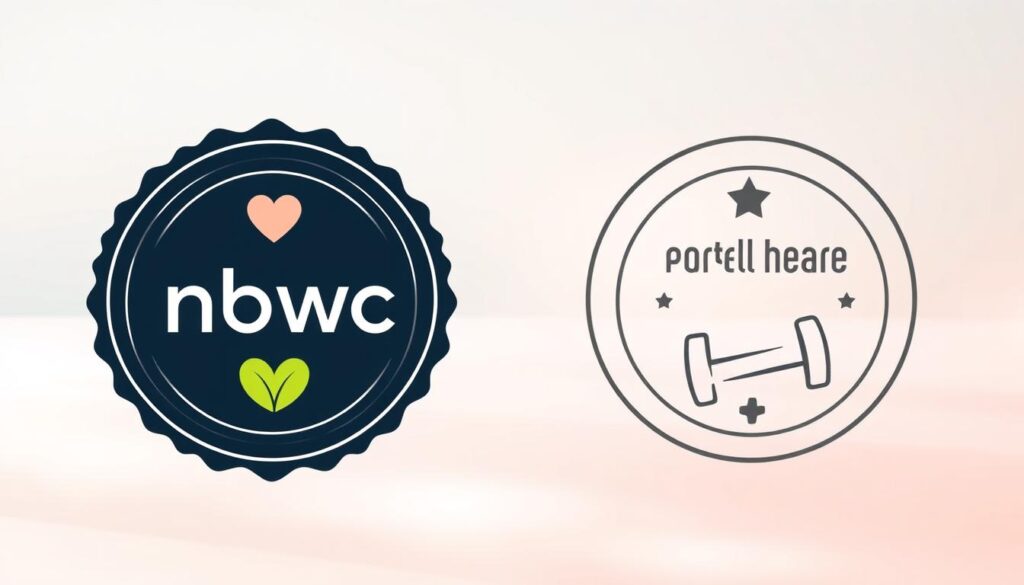In today’s fast-paced world, the need for skilled health and wellness coaches is growing. But what makes the best coaches stand out? The answer is the National Board for Health and Wellness Coaching (NBHWC) certification. It’s a big question: what does this certification mean, and how does it help both coaches and their clients?

The NBHWC certification is the top choice in health coaching, showing who’s truly professional. It makes sure coaches know their stuff and act with the highest ethics. This certification doesn’t just make coaching better. It also makes clients feel confident they’re getting the best help.
Understanding the NBHWC Certification Process
Becoming a National Board-Certified Health & Wellness Coach (NBHWC) is a detailed process. Aspiring coaches need to know several key points.
Prerequisites and Eligibility Requirements
To start, candidates must have a bachelor’s degree or higher from an accredited school. They also need to finish an NBHWC-approved training program. Plus, they must show at least 50 client contact hours and 25 hours of supervision.
Application Timeline and Deadlines
The NBHWC certification has a set timeline with specific deadlines. Aspiring coaches must apply by the due date. After approval, they can schedule their NBHWC exam.
Cost Structure and Financial Considerations
Getting certified comes with costs. The application fee is $395. The exam fee is also $395. Plus, there are costs for an NBHWC-approved training program, which vary.
| Certification Requirement | Cost |
|---|---|
| NBHWC Application Fee | $395 |
| NBHWC Exam Fee | $395 |
| NBHWC-Approved Training Program | Varies by provider |
Understanding the NBHWC certification process helps aspiring coaches prepare. It covers prerequisites, timeline, and costs.

Core Components of NBHWC Training Programs
To get the National Board for Health & Wellness Coaching (NBHWC) certification, you need a detailed training program. These programs focus on the key parts of health and wellness coaching. They mix theory with real-world practice.
At the center of these programs are basic coaching skills. These include listening well, asking good questions, and using motivational techniques. Coaches learn to work closely with clients. This helps clients reach their health and wellness goals.
These programs also cover the newest ideas in the field. This includes using neural networks and other new technologies. These tools help coaches make their work more personal and effective.
The training covers all aspects of coaching. It includes learning about changing behavior, managing lifestyle, and the importance of nutrition and exercise. This training gives coaches the tools to help their clients achieve better health and wellness.
| Core Components of NBHWC Training Programs | Description |
|---|---|
| Fundamental Coaching Skills | Active listening, powerful questioning, motivational interviewing |
| Integrative Wellness Approach | Behavior change theory, lifestyle management, nutrition, physical activity |
| Emerging Technologies | Integration of neural networks and other innovative tools |

“NBHWC-approved training programs equip aspiring coaches with the comprehensive knowledge and skills needed to empower their clients to achieve lasting health and wellness transformations.”
The NBHWC Examination: Structure and Preparation
To get the National Board for Health & Wellness Coaching (NBHWC) certification, you must pass a big exam. This test is the last step to show you’re really good at health and wellness coaching.
Exam Content and Format
The NBHWC exam has 170 multiple-choice questions. It checks your knowledge in six main areas: Foundational Knowledge, Client-Centered Coaching, Health and Wellness Coaching Practices, Professional Conduct and Responsibility, Program Development and Management, and Well-Being and Mindfulness. You have 3 hours to finish it, making sure you’re ready.
Study Resources and Materials
- The NBHWC gives a detailed Exam Content Outline. It shows what topics and skills you’ll need to know.
- There are many study guides and practice exams to help you get used to the exam’s style and content.
- Using deep learning methods in your studying can help you remember and use the information better for the exam.
Test-Taking Strategies
- Make a study plan that covers all the exam areas.
- Practice managing your time by doing simulated exams under time limits.
- Get to know the exam’s format and types of questions to avoid surprises on the day of the test.
- Use good test-taking strategies, like getting rid of obvious wrong answers and reading each question carefully.
Knowing how the NBHWC exam works, what it covers, and how to prepare can help you feel ready. You’ll show your skills to clients and employers in the future.
| Exam Component | Details |
|---|---|
| Total Questions | 170 multiple-choice |
| Time Allotted | 3 hours |
| Passing Score | 70% |
| Exam Content Areas | Foundational Knowledge, Client-Centered Coaching, Health and Wellness Coaching Practices, Professional Conduct and Responsibility, Program Development and Management, Well-Being and Mindfulness |

“The NBHWC exam is designed to ensure that certified coaches possess the deep knowledge and skills necessary to provide exceptional health and wellness coaching services.”
Professional Standards and Code of Ethics
The NBHWC certification is built on a strong commitment to professional standards and ethics. Health and wellness coaches with this certification know they have a big impact on their clients’ lives. They aim to act with the highest integrity and responsibility.
The NBHWC code of ethics provides clear guidelines for certified coaches. It acts as a moral guide, ensuring coaches always put their clients’ well-being first.
Key Principles of the NBHWC Code of Ethics
- Respect for Client Autonomy: Coaches respect their clients’ right to make their own health decisions.
- Competence and Scope of Practice: Coaches work within their expertise and keep learning to improve their skills.
- Confidentiality and Privacy: They protect clients’ personal info and keep confidentiality at the highest level.
- Conflict of Interest: Coaches must disclose any potential conflicts and avoid situations that could harm their clients.
- Continuous Professional Development: They commit to ongoing learning to offer the best support to their clients.
By following these ethical principles, NBHWC-certified coaches show their dedication to their clients and the health and wellness field. This code of ethics is a key part of the NBHWC certification. It sets the standard for excellence and ensures clients can trust their coaches.
Career Opportunities for NBHWC Certified Coaches
Getting the NBHWC certification opens many doors for health and wellness coaches. More people want to prevent health problems and live a balanced life. This means there’s a big need for skilled coaches.
Industry Demand and Growth Potential
The nbhwc certification is in high demand. Employers in healthcare, corporate wellness, fitness, and private coaching want these certified coaches. As more people seek health advice, the job market for NBHWC-certified coaches will keep growing.
Salary Expectations and Benefits
NBHWC-certified coaches can earn good salaries. Their pay depends on where they work, their experience, and more. But, on average, they make a good living and help others reach their health goals.
Career Advancement Paths
- Move from basic coaching to more advanced roles like program management or leadership.
- Specialize in nutrition, fitness, or managing chronic diseases.
- Start your own coaching practice or help organizations with wellness plans.
- Keep growing with ongoing nbhwc certification and nbhwc continuing education programs.
With the nbhwc certification, health and wellness coaches can take on many rewarding roles. They make a big difference in people’s lives and in communities.
Maintaining Your NBHWC Certification
To keep your National Board for Health & Wellness Coaching (NBHWC) certification, you must recertify every two years. You’ll need to complete continuing education and log your professional growth through the NBHWC online portal. This ensures your coaching skills stay sharp and meet the NBHWC’s standards.
The nbhwc recertification process requires 24 continuing education credits every two years. You can get these credits from approved programs, workshops, conferences, and self-study. The NBHWC offers a list of eligible options to help you plan your professional growth.
To manage your certification, log in to the NBHWC’s online portal regularly. This platform lets you track your credits, update your info, and find resources for health and wellness coaches. Staying connected with the NBHWC community helps you grow, network, and stay ahead in the industry.
FAQ
What is the NBHWC certification?
The NBHWC certification is a top mark in health coaching. It shows a coach’s skill in helping clients reach their health goals. It’s based on proven methods.
What are the eligibility requirements for the NBHWC certification?
To get the NBHWC certification, you need a bachelor’s degree. You also have to finish a training program approved by NBHWC. Plus, you must meet certain education and experience standards.
What is the cost of the NBHWC certification process?
Getting the NBHWC certification costs money. You’ll pay for the application, exam, and any training program fees. The total cost depends on the program and location.
What is the format of the NBHWC examination?
The NBHWC exam is a computer test. It checks your knowledge and skills in health coaching. You’ll answer multiple-choice questions about coaching methods and ethics.
How can I prepare for the NBHWC examination?
To get ready for the exam, use study tools like practice tests and coaching books. Also, try deep learning methods to better understand the material.
What is the NBHWC’s code of ethics?
The NBHWC has strict ethics rules for coaches. These rules cover keeping client secrets, knowing your limits, and avoiding conflicts of interest.
What career opportunities are available for NBHWC certified coaches?
Certified coaches have many job options. They can work in healthcare, corporate wellness, or start their own practice. The field is growing, offering good pay and chances for advancement.
How do I maintain my NBHWC certification?
To keep your certification, you must recertify every three years. You’ll need to earn continuing education credits, pay fees, and follow the NBHWC’s ethics. You can manage your certification through the NBHWC portal.
